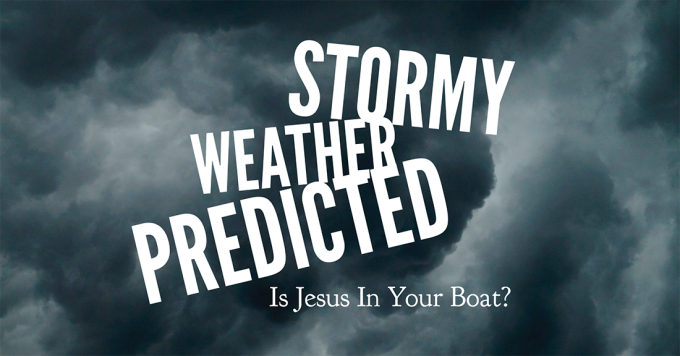
It seems each day brings another storm, or a continuing storm, or the promise of many storms to come. Storms come in many sizes, many varieties, and can be long-term or short-term. We may experience actual bad weather storms but we also experience other countless storms of life—a wayward family member, a job loss, a catastrophic diagnosis, a financial reversal, a sudden accident, or loss of a loved one. All of us are involved in the current pandemic storm and the current unrest and violence throughout our country. And, we all know there is no shortage of storms even for God’s people.
In Exodus 9:24, God sent the worst storm ever experienced in all the land of Egypt because Pharaoh would not let God’s people go. In Jonah 1:4, God sent a violent storm because Jonah refused to obey. Although Pharaoh hardened his heart even more, Jonah repented and was saved. Sometimes we bring about our own storms and we need to turn back to God and repent. At other times, storms happen that are not always punishment for wrong choices we have made.
In Mark 4:35-41, Jesus and the disciples encounter a storm: That day when evening came, he said to his disciples, “Let us go over to the other side.” Leaving the crowd behind, they took him along, just as he was, in the boat. There were also other boats with him. A furious squall came up, and the waves broke over the boat, so that it was nearly swamped. Jesus was in the stern, sleeping on a cushion. The disciples woke him and said to him, “Teacher, don’t you care if we drown?” He got up, rebuked the wind and said to the waves, “Quiet! Be still!” Then the wind died down and it was completely calm. He said to his disciples, “Why are you so afraid? Do you still have no faith?” They were terrified and asked each other, “Who is this? Even the wind and the waves obey him!”
While Pharaoh and Jonah were in storms because of disobedience, the disciples are in this storm because of their obedience to Jesus. Jesus had said to them, “Let us go over to the other side,” but they forgot that when the storm came. Even though Jesus was with them, they were terrified!
At this point, they did not know who Jesus really was and that they had all the power in the world right there in the boat with them. Jesus calmed the storm and rebuked the disciples for their lack of faith.
Note: I have read the above passage multiple times. As I read these verses today, suddenly one sentence stands out: There were also other boats with him. I don’t remember ever seeing this sentence before. So, I checked other translations to be sure this wasn’t something that had been added to my translation. No, it’s been there all along. (God’s word is indeed new every morning.) How many boats are we talking about here? How many people were in the boats? Did any or all of them know they were rescued by Jesus? We don’t know the answers to these questions, but we can learn a lot from this sentence. It’s not all about me or all about you. It’s about what God is doing in and through us. The way we go through a storm can be a blessing or a stumbling block to the “other boats” around us. The focus in this passage was on Jesus calming the storm and teaching His disciples, but His work also saved the lives of the people in the other boats.
In Acts 27:1-26, the Apostle Paul set sail for Rome even though he knew that sailing at that time of year was dangerous. Paul had warned the captain/centurion of the ship, but they thought they knew better and Paul was overruled. A huge storm came, the crew tried valiantly to save the ship, but soon all hope for survival vanished. Paul stood bravely before the men and told them they should have taken his advice not to sail, but they were to take courage because not one of them would be lost even though the ship would be destroyed. Paul told them an angel of the Lord “whose I am and whom I serve” had stood beside him and said, “Do not be afraid.” Paul told them he believed God and everything would happen just as God has said…and it did! Paul’s desire was to calm the fears of these terrified men who had given up all hope of survival.
Paul believed God despite the storm roaring all around him and he hoped these men would follow his example. In Matthew 14:22-33, Peter gave us an example of walking in faith. When Peter kept his eyes on Jesus, he did the miraculous and walked on water. When Peter allowed his eyes to move from Jesus to the wind and waves swirling around him, he began to sink—but he also knew to cry out to Jesus. Jesus reached out His hand and saved Peter. In our human frailty, we sometimes focus on our circumstances and begin to sink. When we keep our eyes on Jesus—when we cry out to Him—He reaches out His hand and saves us. What do we learn about storms when we read God’s Word?
1. There will be storms.
2. No storm, no pandemic, no unrest, no circumstance, and no person will interfere with God’s plan. God is in control.
3. We do not have to go through the storms of life alone. God is always with us to give comfort, peace, and to help and guide.
4. The way we go through storms can encourage or discourage others. We are part of a bigger picture.
5. Pray for yourself and others as we go through storms. Pray for people to return to God and see that God is more real and powerful to them than their circumstances.
6. Most important—let’s make sure Jesus is in our “boat.”

